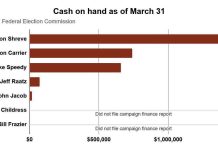INDIANAPOLIS — State officials and a former Indiana Supreme Court justice are raising concerns that a law to extend rather than adjourn the 2021 session blurs the separation of powers and could have “dangerous” implications for the future.
The Indiana General Assembly passed House Bill 1372 late in the session with little discussion or opposition, extending the legislative session until Nov. 15. The coronavirus pandemic postponed 2020 census results and the change was necessary in order to vote on election redistricting in the fall, proponents say. Gov. Eric Holcomb signed the bill on Monday.
Now some worry the unusual move could set a precedent for a full-time Legislature, and others wonder about lawmakers fundraising while technically still in session, which is typically not allowed.
The measure is already causing a potential problem for Indiana Secretary of State Holli Sullivan, a Republican who on Monday announced her 2022 election campaign. Sullivan is the Indiana Republican Party’s vice chair and was in her seventh year as a state representative from Evansville when Gov. Eric Holcomb appointed her as secretary of state in March.
The Libertarian Party of Indiana almost immediately accused Sullivan of violating Indiana’s election law prohibiting fundraising during a budget session when she announced her campaign and solicited and accepted campaign contributions on Facebook.
The law also creates other potential problems.
Frank Sullivan, former Indiana Supreme Court justice and professor at Indiana University’s Robert H. McKinney School of Law, said by extending the session now, legislators may find themselves not wanting to give their newfound power back later.
“This principle that used to be sacrosanct has been abandoned, at least in the short run,” Sullivan said. “And it will be interesting to see whether the genie can ever be put back in the bottle or the mercury back in the vial.”
Extending the session
The session has never been extended at the Indiana Statehouse, at least as far as Beverly Gard, a Republican former senator of 24 years from Greenfield, knows.
Gard said that when she was in the Senate, members went into special session a couple of times to finish the budget, but she has never seen anything like this.
“I think it’s a pretty scary precedent to start setting,” Gard said. “If things like this continue into the future, it could lead to a full-time Legislature, and that is certainly not in the best interest of the state of Indiana.”
Since the Indiana Constitution states that the length of the legislative session shall be set by law, the extension is not unconstitutional, says Sullivan. HB 1372 states that the current April 29 deadline will still be in place for future long sessions.
In all other aspects, the legislative session will act as though it is adjourning for the year. HB 1372 still requires Holcomb to sign or veto bills by the usual deadline, most new laws will still go into effect July 1, and legislators will switch to their out-of-session pay rates.
The major concern coming from former legislators is that by finding a way to extend the session legally and constitutionally, it sets a precedent for the Legislature to easily do this again in future years.
During a media availability Thursday, House Speaker Todd Huston, R-Fishers, said he and Senate President Pro Tem Rodric Bray, R-Martinsville, wanted to hear the term “sine die” to adjourn the session more than anyone.
“This will not be a historical precedent because we desperately look forward to hearing those two words in the future,” Huston said.
However, others, including former Democratic Indiana House Speaker John Gregg, who ran against Holcomb for governor in 2016, say it will be too tempting to lawmakers not to use again.
Gregg said that by merely recessing rather than adjourning, it’s setting a precedent for lawmakers to call themselves into session whenever they want.
“They are basically, in my opinion, turning themselves into a full-time Legislature, which I don’t think is something most Hoosiers are aware of or probably support, Democrats or Republicans,” Gregg said.
Keeping a governor in check
Current and previous lawmakers are also concerned that the Republicans in the Legislature want the ability to keep the governor, also a Republican, in check when it comes to making executive decisions, as Holcomb has been doing for more than a year during the pandemic.
Holcomb vetoed HB 1123, allowing the Legislature to call itself back into session during an emergency, but the General Assembly overrode his veto earlier this month, ultimately limiting his powers while boosting the Legislature’s. Holcomb said it violates the separation of powers outlined in the Indiana Constitution because the state’s legislative body would be encroaching on the governor’s powers as head of the executive branch.
Sullivan said that while it doesn’t go against the constitution to extend the legislative session, the legislators wanting to call themselves into session is unconstitutional.
“Our constitution sets forth various boundaries between the relative authority of the executive, legislative and judicial branches, and there are some things that each branch can do, and there are other things that they are prohibited from doing,” Sullivan said.
Gregg agrees that the Legislature calling special sessions is unconstitutional and that if the Legislature is “expanding and growing their powers like this,” they’ll want to assume more of the governor’s role, like approving his appointments—weakening the governor’s position.
“It’s a very dangerous, in my opinion, power grab,” Gregg said. “We have a separation of powers, which has worked really well for the last 170 years under our current Constitution. And I don’t think it needs to be changed.”




